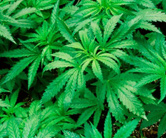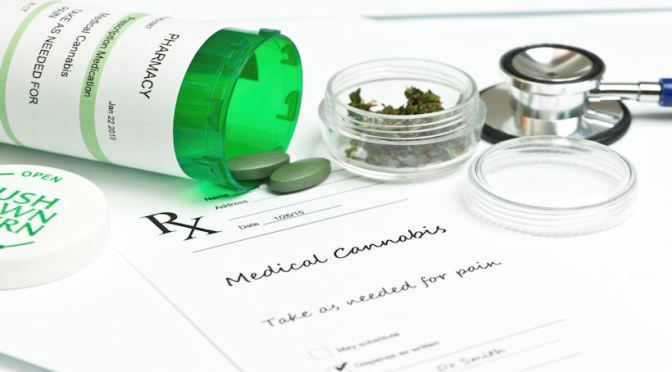Source of Featured Image:
http://www.nhs.uk/news/2010/08August/Pages/cannabis-and-chronic-nerve-pain.aspx
Dear Pain Matters blog readers,
Cannabis has been used for medicinal benefits including pain relief by many cultures for hundreds of years or more. While some patients smoke cannabis for medicinal purposes, others may prefer to make cannabis tea or bake cannabis cookies.

Is Medicinal Marijuana Effective for Nerve Pain?:
The use of marijuana for chronic pain relief is not new. Many patients attest to its ability to relieve pain, while many physicians acknowledge its efficacy in patients with intractable pain who were otherwise left with few other options.
According to Mark Ware, Pain Clinician, McGill University, Montreal, Canada, endogenous cannabinoids bind with cannabinoid receptors presynaptically, blocking the release of neurotransmitters in pain-producing pathways, resulting in less pain.
As agonists, synthetic (e.g. nabilone – see earlier Blog Post, referenced below) and plant-derived cannabinoids (i.e. derived from marijuana) bind with these same cannabinoid receptors, leading to reduced pain.
https://painmatters.wordpress.com/2014/10/29/nabilone-for-chronic-pain-including-nerve-pain/ (Nabilone for Chronic Pain Including Nerve Pain (e.g. CRPS))
Sativex (Nabiximols, in US):
Sativex (Nabiximols), a cannabis-based mouth spray, was approved in the UK as adjunctive treatment for relief of neuropathic pain in multiple sclerosis (MS). Some trials showed that Sativex significantly reduced neuropathic pain, spasticity, muscle spasms and sleep disturbances in some MS patients. Care must be taken to manage adverse effects including dizziness, sleepiness, fatigue, dry mouth and drowsiness. The long-term effects including risk of tolerance are unknown (Perras, 2005).
Sativex (Nabiximols) is approved in Canada for the treatment of nerve pain and spasticity in MS as well as cancer pain.
Smokeless Delivery Systems Including Vaporizers and Cannabis Inhalers:
Due to the risk of lung damage that may be caused by smoking medicinal cannabis, smokeless delivery systems including vaporizers (and soon, cannabis inhalers) may be useful.
Vaporizers can avoid possible lung damage as they can be used to heat the medicinal cannabis herb sufficiently without burning it nor creating smoke. Vaporized cannabis has analgesic efficacy at low dose with minimal and well-tolerated psychoactive effects (Wilsey et al, 2013).
Research into cannabis inhalers is currently being done that uses cannabis processed into granules. This device ensures that dosages are better controlled and that blood tetrahydrocannabinol (THC) delivery levels remain well below ‘recreational levels’ (i.e. that can lead to a ‘high’). This particular study involving 8 patients with chronic nerve pain showed a 45% reduction in pain intensity, 20 minutes post-inhalation (that returned to baseline within 90 minutes). The only adverse effect was lightheadedness that lasted 15-30 minutes and that did not require intervention (Eisenberg et al, 2014).
Is Medicinal Marijuana Legal?:
Please check with local authorities including local physicians regarding the legalities of medical marijuana.
In Australia, marijuana is legal in most states and territories for certain medical conditions and only if prescribed by a doctor.
In the US, the sale and possession of cannabis was recently decriminalized for both medical and recreational users who are of legal age in 5 states (Alaska, Colorado, Oregon, Washington and Washington DC). However, marijuana possession or use (medical or otherwise) is still illegal and considered a federal crime under federal law in the US.
In Canada, medical marijuana use is legal as long as the patient has a licence for this. As of 24 August 2016, medical marijuana patients can grow their own ‘limited amount’.
Medical marijuana via doctor’s prescription was legalized in March 2017 in Germany. The Federal Health Minister, Hermann Gröhe, stated:
‘Our goal is that seriously ill people are looked after to the best of our ability.’
Gröhe added that health insurance companies should cover the costs of medical marijuana in cases where treatment alternatives do not exist.
In Switzerland, marijuana is legal since 2016 as long as the tetrahydrocannabinol (THC) component is less than 1%. Legally restricting THC in cannabis to very low levels will ensure that a recreational ‘high’ will not occur (as opposed to THC-rich cannabis that can cause a recreational ‘high’). Thus, THC-poor cannabis is legal in Switzerland.
On the other hand, the cannibinoid (CBD) component of marijuana (aka CBD-Cannabis) is legal as it does not lead to a recreational ‘high’. Importantly, it may offer pain relief, reduced nausea and other medical benefits.
Medical cannabis is legal in other countries including Uruguay, Israel and Jamaica.
Summary:
Medical marijuana may offer pain relief today to patients with severe, intractable pain where other pain treatments have failed.
Quoting Mark Ware:
[The pharmaceutical approach is] “promising, highly protected with patents, and highly financially rewarding [and] will take 5 to 10 years. We have patients struggling now and need to figure out how to use this [medical marijuana] today.”

Source of photo: http://www.painresearchforum.org/news/48905-treating-neuropathic-pain-cannabis-pro-and-con
Sabina Walker
“Sedare dolorem divinum opus est”
“It is divine to alleviate pain”
Galen, 130-200 C.E.
REFERENCES:
Media
Is Medicinal Marijuana Effective for Nerve Pain?
(1a) Treating Neuropathic Pain With Cannabis: Pro and Con
Debate-Style Session at World Congress on Pain Focuses on Safety, Efficacy of Marijuana for Neuropathic Pain
Pat McCaffrey
Pain Research Forum (22 Dec 2014)
http://www.painresearchforum.org/news/48905-treating-neuropathic-pain-cannabis-pro-and-con
Attachment (Slides by Mark Ware):
http://www.painresearchforum.org/sites/default/files/attachments/WareCannabisDebateslides.pdf
(1b) Researchers Urge Medical Marijuana Over Opioids to Treat Neuropathic Pain
Mike Hager
Is Medicinal Marijuana Legal?
United States of America
(2a) State Medical Marijuana Laws
20 July 20 2016
http://www.ncsl.org/research/health/state-medical-marijuana-laws.aspx
Canada
(2b) Medical Marijuana Patients Can Grow ‘Limited Amount’ of Cannabis at Home Under New Laws – Change Comes After Federal Court Said Old Rules Were Unconstitutional
Andrew Foote
CBC News (11 August 2016)
http://www.cbc.ca/news/politics/medical-marijuana-home-growing-law-1.3716860
(2c) Medical Marijuana Easier to Grow at Home With New Rules – Some Doctors Say Medical Cannabis is Safer than Opiates, While Others Say It’s Too Unpredictable
Julia Wright
CBC News (25 Aug 25 2016)
http://www.cbc.ca/news/canada/new-brunswick/growing-medical-cannabis-1.3735112
Australia
(2d) Senate passes medicinal cannabis legislation
Jane Lee
Sydney Morning Herald (24 February 2016)
Germany
(2e) Germany to Legalize Medicinal Marijuana by 2017
Joshua Berlinger
CNN (4 May 2016)
http://edition.cnn.com/2016/05/04/europe/germany-medicinal-marijuana/
In German
(2f) Schmerztherapie – Hype um vermeintliche Wunderarznei: Was Cannabis kann – und was nicht.
Sabine Dobel, Gisela Gross
Stern (3 June 2017)
This article also includes the following 2-minute video (also in German):
Switzerland
(2g) Swiss cannabis entrepreneurs develop craving for low-potency pot.
Marina Depetris, John Miller
Reuters (22 March 2017).
http://www.reuters.com/article/us-swiss-cannabis-light-idUSKBN16S2D4
In German
(2h) Kiffen light – so wirkt das legale Cannabis aus der Schweiz
Laila Keuthage
Stern (17 May 2017)
Peer-Reviewed Papers
(3) Wilsey B, Marcotte TD, Deutsch R, Gouaux B, Sakai S, Donaghe H.
Low Dose Vaporized Cannabis Significantly Improves Neuropathic Pain.
The Journal of Pain (2013);14(2):136-148.
doi:10.1016/j.jpain.2012.10.009.
http://www.ncbi.nlm.nih.gov/pmc/articles/PMC3566631/pdf/nihms439212.pdf
(4) Perras C.
Sativex for the Management of Multiple Sclerosis Symptoms.
Issues Emerg Health Technol. 2005 Sep;(72):1-4.
https://www.ncbi.nlm.nih.gov/pubmed/16317825
(5) Eisenberg E, Ogintz M, Almog S
The Pharmacokinetics, Efficacy, Safety, and Ease of Use of a Novel Portable Metered-Dose Cannabis Inhaler in Patients With Chronic Neuropathic Pain: A Phase 1a Study
Journal Of Pain & Palliative Care Pharmacotherapy (2014); 28(3)
doi.org/10.3109/15360288.2014.941130
http://www.tandfonline.com/doi/full/10.3109/15360288.2014.941130
Medical Cannabis Support Groups
(6) Medical Cannabis Users Association (MCUA) of Australia
Patient Anecdotes – Patient Testimonials
http://www.mcuainc.org.au/patientstor.html
Patient Videos – Patients Speak Out

Sabina, this is very useful. With ever changing legalisation of prescription and recreational cannabis use taking place I encourage you to update this information on a regular basis. Very useful. Thanks. BGL
LikeLike
Thank you very much for your kind words of encouragement, Bruce!
I will do my best to update this blog post when and as needed.
For now, the biggest problem seems to be that ‘the right hand is not talking to the left hand’. Thus, while medicinal cannabis (including cannabidiol; CBD) is now legalised, patients still need a doctor’s prescription. Many patients struggle to find a doctor who is able to and/or who is willing to prescribe medicinal cannabis including non-hallucinogenic CBD for pain and other medical issues.
This is NOT in the best interests of pain patients in Australia who not only are struggling with pain, but who are also struggling with a system that does not make it easy to obtain a prescription for medicinal cannabis.
I do not know why this is so. I am sure this could be improved, for the sake of patients living with pain in Australia.
Someone needs to look into this issue (and it is outside the scope of my blog). I am ‘only’ a medical writer/blogger.
Thanks again for your interest!
LikeLike